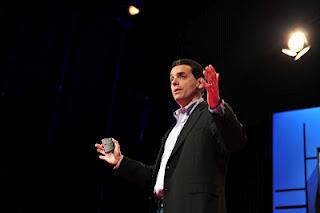In primo luogo abbiamo chiesto a Dan come è nato il suo progetto Office Hours: Dan ci ha rivelato che aveva quest'idea da molto tempo, ovvero quella di immaginare che anche persone interessanti in diversi ambiti abbiano le “ore di ricevimento”, come i professori, durante le quali le persone potessero fare domande e conversare su diversi argomenti. Il progetto ha avuto un grande successo, e con un costo praticamente nullo è arrivato ad essere una vera e propria trasmissione radiofonica disponibile in tutto il mondo. [video]
In secondo luogo abbiamo chiesto quali siano le migliori strategie per far sì che le persone sentano ancora di avere uno scopo, nel momento in cui molte attività da colletti bianchi verranno automatizzate, così come in passato sono state automatizzate le attività dei colletti blu. Dan ha messo in discussione la premessa di questa domanda: c'è una nozione in economia, chiamata “fallacia del grumo del lavoro”, secondo la quale esite un certo numero di posti di lavoro. Quando uno di questi posti di lavoro viene perso a causa dell'automazione o dello spostamento degli impianti in un altro paese, si presuppone che qualcuno ne abbia a soffrire. Questo tuttavia è dimostratamente falso, anche e soprattutto perché il panorama è cambiato moltissimo negli ultimi anni. [video]
 Un'altra domanda che abbiamo fatto riguarda la natura della motivazione, ovvero se questa sia causata da un bisogno di tenere il passo con le aspettative altrui oppure è generata da una spinta interna. Secondo Dan la motivazione ha diversi motori: alcuni sono biologici, altri riguardano punizioni e ricompense, che costituiscono una grande parte della nostra natura. C'è da dire che sarebbe necessario riconoscere il fatto che gli esseri umani sono motivati a fare certe cose anche semplicemente perché sono interessanti, perché ci importano e sono rilevanti nel mondo. [video]
Un'altra domanda che abbiamo fatto riguarda la natura della motivazione, ovvero se questa sia causata da un bisogno di tenere il passo con le aspettative altrui oppure è generata da una spinta interna. Secondo Dan la motivazione ha diversi motori: alcuni sono biologici, altri riguardano punizioni e ricompense, che costituiscono una grande parte della nostra natura. C'è da dire che sarebbe necessario riconoscere il fatto che gli esseri umani sono motivati a fare certe cose anche semplicemente perché sono interessanti, perché ci importano e sono rilevanti nel mondo. [video]Alcune tra le barriere più rilevanti quando si tratta di implementare i risultati di questo genere di ricerca nelle aziende sono costituite dal fatto che alcuni tipi di motivatori possono avere ottimi risultati nel breve termine, anche se provocano molti danni collaterali nel lungo termine. Un'altra grande barriera è quella dell'abitudine: certe strutture sono talmente radicate da rendere difficile un cambiamento, per quanto esso sia documentato. [video]
Infine abbiamo chiesto a Dan se ci sono nuovi studi che sta analizzando e che condividerà in futuro: ci ha rivelato che fondamentalmente troviamo sempre nuove conferme di quel che è stato trovato finora, che evidenziano come la motivazione sia più complessa, più complicata e per certi versi più nobile di quanto vogliamo ammettere. Gli esseri umani sono creature interessanti, che non fanno cose solo per sopravvivere, ma anche per ragioni più profonde e più alte. Non bisogna dimenticarlo, perché in caso contrario faremmo un grande torto a noi stessi e al mondo, costringendo certi talenti a rimanere nascosti. [video]
Vi invito a visionare l'intervista integrale, molto più ricca di dettagli rispetto a questa mia breve sintesi!
Buona visione!
Maria Petrescu
Intervistato.com | Dan Pink
Some time ago we had the pleasure of interviewing Dan Pink, renown expert of motivation, particularly known for his TED talk "The surprising science of motivation".
First of all we asked Dan how his Office Hours project was born: Dan has revealed that he had the idea for a long time, which was to imagine that interesting people in different fields had "office hours" just as professors have, during which you can go in and ask questions or talk about different topics. It was something that didn't exist, so he did it. The project had a resounding success, and for virtually zero cost he managed to do the equivalent of a radioshow which is available all over the world. [video]
Secondly we asked what the best strategies are to make people feel that they still have a purpose, in a historical moment when many white collar activities are being taken over by automated machines, just as blue collar jobs have been automated in the past. Dan has put into question the premise itself: there is a notion in economics called "the lump of labor fallacy", that states that there is a limited number of jobs, and when jobs are lost because of automation or dislocation, then someone will necessarily have to suffer. This has been proven to be wrong, also because the work scenario has changed extremely much during the last few days. [video]
Another question we asked is about the nature of motivation, and in particular whther it is driven by a need to keep up with other people's expectations or whether it is generated by an internal drive. In Dan's opinion motivation has a series of engines: some are biological, others regard rewards and punishments, which are a big part of who we are. We also must recognize that fact that human beings are motivated to do things also because they're interesting, because they matter to us, or because they are relevent for the world. [video]
Some of the most important barriers when it comes to implementing these kinds of results in companies are habit and short term goals: some types of motivators, such as "if-then" motivators, have great results in the short term, even though they can do all sorts of collateral damage in the long run. Habit is extremely difficult to eradicate: some structures and ways are so established that change is difficult, even though its positive effects are documented. [video]
Finally we asked Dan whether there are new studies he's into: he revealed that we are currently in a phase of confirmation of what we know, and studies point out how motivation is more complex, more complicated and in some ways more noble than we give it credit for. Human beings are interesting creatures that don't do things only to survive, but also for deeper, higher reasons. We shouldn't forget that, because otherwise we'd be shortchanging ourselves and the world, forcing certain talents to remain hidden. [video]
I invite you to view the full interview, much richer in details than my brief synthesis.
Enjoy!
Maria Petrescu







